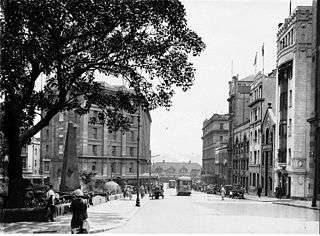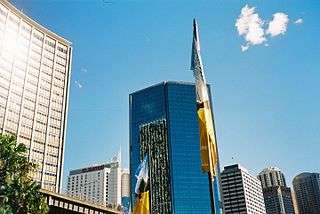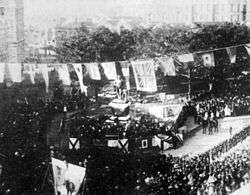Macquarie Place


Macquarie Place is a small triangular park in central Sydney, Australia. It is located at the corner of Bridge Street and Loftus Street, and is named after Governor Lachlan Macquarie.
History
Macquarie Place was the first formally laid out public space in Sydney (1810), functioning as the town square. Along with Hyde Park it is the oldest public park in Australia. Its size has been greatly reduced since colonial days.
An obelisk from 1818 and designed by the New South Wales Government Architect, Francis Greenway, is located in the park and records the distance to various locations in New South Wales along the earliest roads developed in the colony. Later an anchor from the Norfolk Island wreckage of the First Fleet flagship, HMS Sirius, together with a cannon from the ship, were placed in the park.
Many important institutions have had establishments at Macquarie Place. In 1817 Australia's first bank, the Bank of New South Wales (later to become Westpac in 1982) opened in Macquarie Place. The State Library of New South Wales briefly had premises in the place during the 1830s. Opposite the place in Bridge Street is the original New South Wales Lands Department head office, which was the department responsible for surveying and mapping New South Wales.
In 1883 a statue of early Australian Industrialist, Thomas Mort was unveiled in the park. In 1954 Queen Elizabeth II and the Duke of Edinburgh marked the beginning of the Remembrance Driveway by planting two plane trees in Macquarie Place.
The Great North Walk to Newcastle starts/ends at the obelisk in Macquarie Place.
Gallery
 The Macquarie Obelisk.
The Macquarie Obelisk. The anchor from HMS Sirius as it stands today.
The anchor from HMS Sirius as it stands today. Cannon from HMS Sirius.
Cannon from HMS Sirius. The statue of Thomas Mort that was unveiled in 1883
The statue of Thomas Mort that was unveiled in 1883 Unveiling of HMS Sirius' anchor at Macquarie Place in 1907
Unveiling of HMS Sirius' anchor at Macquarie Place in 1907 Unveiling of the Thomas Mort statue in Macquarie Place, 1883
Unveiling of the Thomas Mort statue in Macquarie Place, 1883
External links
| Wikimedia Commons has media related to Macquarie Place. |
- City of Sydney: Macquarie Place Park, Sydney Retrieved 2015-09-28
- Anne-Maree Whitaker (2008). "Macquarie Place". Dictionary of Sydney. Retrieved 28 September 2015. [CC-By-SA]
- Anchor and cannon from HMS Sirius Retrieved 2011-08-27
- Heritage Office History and Statement of Significance Retrieved 2011-08-27
Coordinates: 33°51′48″S 151°12′36″E / 33.8633°S 151.2100°E